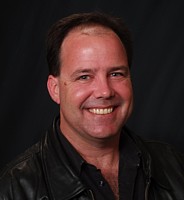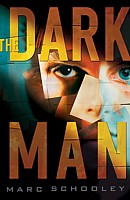Please Welcome...Marc Schooley
What a joy to have Christian speculative fiction author Marc Schooley as our interview guest this month here at WhereTheMapEnds.com. In his own words, Marc is "the 'not so much science, fiction writer who generally writes and reads nonfiction, so if I can do it, anyone can' author of The Dark Man, and a man who values the Bible above all other books, and as the standard by which they all ought to be measured." Marc is one of three Christian novelists whose books comprise the second release list at Marcher Lord Press. Marc's debut novel, The Dark Man, is hard to classify, but here's a try. It's a near-future psychological thriller in a dystopian America about a man on his own Damascas Road, who flies helicopter gunships and talks to a wooden block puzzle. Weirded out yet? It sounds bizarre, and it is, but it is tremendous. The Dark Man was the first book I acquired for the second list at Marcher Lord Press. I was utterly engaged by the story, the writing, and the characters. (The Dark Man released April 1, 2009.)
Marc describes The Dark Man as possessing "a wealth of metaphorical
undertow, surface-level abstraction, popular and cultural element
interplay, and most importantly, orthodox theological themes." And
bombs and stuff. He also works at a company in Houston that supports NASA, so the technology and landmarks in The Dark Man (a near-future thriller set in Houston) ring especially true. So without further ado, here's the interview. WhereTheMapEnds: Catch us up with you. What have you been up to lately? Marc Schooley: I’ve been administering subcontracts for highly complex space flight hardware and systems for the Space Shuttle, International Space Station, and new Constellation program. It’s consumed a great deal of time lately, but it’s always worth it when a system you’ve had a part in functions well in space. Also, when the new missions take off for Mars and the Moon, it’ll be an exciting time knowing I’ve been able to play a role in NASA mission success. I have a great family, even though I’m demonstrably more normal* than them, and we try to spend as much time together as possible. * I’m a fairly normal guy. Well, allow me to qualify that. I’m uber-normal in the context of my family, which regularly hosts normalcy contests. I’m the currently undefeated and reigning normalcy champion. WhereTheMapEnds: O...kay. [grin] So, Marc, Mr. Normal, what is your favorite speculative novel of all time (Christian or secular) and why is that your favorite? Marc Schooley: I am nearly a CS Lewis completist, and have a good and growing collection of older editions of all his works. I would categorize many of his works as speculative, although grounded with mere Christian doctrine. Some of my favorites are The Great Divorce, The Pilgrim’s Regress, the Perelandra space trilogy, Screwtape, and really anything he has written.
I admire his wit and use of metaphor, his ability to insert Christian
doctrine seamlessly into any context, and his unabashed acceptance of
Christianity in its full rigour. Now to embarrass myself: I love both John Carter of Mars and Tarzan. Why they haven’t filmed John Carter is beyond me. MS Quixote thinks that Stephen King is the premier fiction writer of our generation. [Editor's note: MS Quixote is Marc's mischievous alter ego.] I think he fancies himself chasing towers rather than windmills. WhereTheMapEnds: What made you want to write Christian speculative fiction? Marc Schooley: I wrote my Master’s thesis on the Problem of Evil (POE) as experienced through the eyes of two used car salesman (who better to discuss the POE, right?) transported to an allegorical underworld by the devil. There, they entered into a game of chess with the devil for their very lives, the pieces each representing, and subsequently ushering in, a facet of the POE. It was great fun, and, in fact, an experience that spurred me to write The Dark Man. I am forever indebted to Professor Craig White, a.k.a. “the Captain,” my thesis advisor, who pushed me in the direction of writing fiction.
WhereTheMapEnds: How was your first idea for a Christian speculative
novel received (by anyone: spouse, friends, parents, agent, publisher,
readers, reviewers, etc.)?
Marc Schooley: Of the only four people that I’m aware of who have read
the book, or have more than a vague idea of what it’s about, the
results are promising thus far. NOTE: we’re not sure yet if MS Quixote
counts as a fifth, or is actually the author himself. More on this as
the investigation unfolds.
I invite you to read the book, dear reader. If you think it's good,
write me and let me know why. If you think it's bad, write me and let
me know why. If you think it’s mediocre, write me and let me know why.
If you think it was halfway between good and mediocre, wr— Well, you
get the point.
WhereTheMapEnds: What is your favorite speculative genre to read? To
write? If they’re different, talk about that.
Marc Schooley: To be honest, my favorite speculative genre is
nonfiction, specifically relating to philosophy and theology. There’s
a wealth of speculative material in both of these disciplines, and I
believe they provide much speculative fiction with ideas.
Interestingly, it’s probably a two-way street.
Take consciousness, for instance. It’s something we experience
firsthand every day; yet it’s one of the most enigmatic and elusive
phenomena known, and extremely problematic to define and describe
philosophically with any degree of certainty. Thus, there’s a wealth
of speculative material written regarding this subject.
Now, when you pick up a speculative novel, or any novel for that
matter, you’re ushered, normatively (there’s that word again) into a
foreign consciousness. It’s an art form that probes the meaning and
feel of consciousness, and provides a medium with which to experience
another’s thoughts immediately, if only vicariously.
Several of The Dark Man’s characters reveal a facsimile of their
“stream of consciousness,” which is evaluated in the context of a
Christian worldview. I hope you enjoy it. I know I did. And did I
mention there’s plenty of bombs, and love, and stuff, in case that’s
what you’d rather read about?
The same concept holds with regard to the greater questions in life:
Who am I? Where did I come from? Where am I going? I believe
speculative nonfiction and fiction both play a role in exploring these
great questions, subordinate to Scripture, obviously, and often the
arbitrary lines between the two disciplines are blurred to obscurity.
You’ll most certainly encounter these questions in The Dark Man, and
you’ll connect with other’s thoughts and perceptions in relation to
these questions and others, and hopefully your own conceptions will be
honed through this interaction.
WhereTheMapEnds: Yikes, I feel like I'm earning a master's degree
myself, just listening to you! What do you think Christian speculative
fiction writing and/or publishing will look like in three years? Five
years? Ten years?
Marc Schooley: This is something that worries me. There’s always the
temptation to desert the Christian faith for success. I think this is
fairly common in Christian music these days, and I’d hate to see the
same thing happen with Christian writing. I think writing is more
insulated, as it’s less image-driven, than music, but the potential
always exists for trouble, as with everything else in life.
WhereTheMapEnds: Yes, that's a danger. Any kind of success can breed
as many problems as it solves. There's always the risk of believing
your own positive reviews too much and deciding you don't need to keep
improving. There's also the risk of believing your negative reviews
too much, and thus becoming depressed.
All Christians, and especially Christians who are creative types, must
stay grounded in Christ to maintain a good balance.
So, Marc, what advice would you give to someone who aspires to write
and publish Christian speculative fiction?
Marc Schooley: Write for the audience of One, as defined in
Tip #1 on
wherethemapends.com, and have fun. Everything else is background
noise.
WhereTheMapEnds: Good counsel. What’s the best book or seminar on
fiction writing you know?
Marc Schooley: Wherethemapends.com
tips for writers, and the other
books Jeff recommends there.
WhereTheMapEnds: [blushes] Thanks, Marc. (I promise, I didn't put him
up to that!) What’s the best part about writing and publishing
Christian speculative fiction?
Marc Schooley: There are two things. The first is proclaiming the
gospel and communicating the great truths of the Christian faith. If
you’re a Christian, you know what I mean.If you’re not, you need to
find out.
WhereTheMapEnds: What writing project(s) are you working on now?
Marc Schooley: The Ring of Nine—tentative title of the sequel to
The
Dark Man.
Mission Impolitical—tentative title of a nonfiction work about the
church and its involvement in politics. On Atheism—a novel with nonfiction commentary considering "the new atheism." [Editor's note: Marc's second novel, Konig's Fire, was released by Marcher Lord Press as part of the fifth release list.]
WhereTheMapEnds: Those sound terrific. So, Marc, what’s the best
speculative story (Christian or secular, book or otherwise) you’ve
encountered lately?
Marc Schooley: You mean other than
the Personifid Invasion,
Summa
Elvetica, and
Hero, Second Class, right?
Orthodoxy, by GK Chesterton. It’s not a story, but it’s speculative in
its own right. It’s work, but fruitful labor. I don’t know what took
me so long to find it. Here's a quote:
“Of necessary dogmas and a special creed I shall speak later. But that
transcendentalism by which all men live has primarily the position of
the sun in the sky. We are conscious of it as of a kind of splendid
confusion; it is something both shining and shapeless, at once a blaze
and a blur. But the circle of the moon is as clear and unmistakable,
as recurrent and inevitable, as the circle of Euclid on a blackboard.
For the moon is utterly reasonable; and the moon is the mother of
lunatics and has given to them all her name.”
WhereTheMapEnds: Wow. I'm not sure I know what any of it means, but
it sounds good. :-P So what else would you like to say to readers of
WhereTheMapEnds?
Marc Schooley: 1 Tim 1:15-17: "It is a trustworthy statement, deserving full acceptance, that Christ Jesus came into the world to save sinners, among whom I am foremost of all. Yet for this reason I found mercy, so that in me as the foremost, Jesus Christ might demonstrate His perfect patience as an example for those who would believe in Him for eternal life. Now to the King eternal, immortal, invisible, the only God, be honor and glory forever and ever. Amen" That's All for This TimeGlad you're one of us now, Marc. A big "thank you" for taking the time. You can visit Marc online here. And if you missed the previous months' interviews with other speculative authors, including Frank Peretti, Jerry Jenkins, Karen Hancock, Tosca Lee, and Ted Dekker, you can read them here. And be sure to come back next month for an interview with another mover and shaker in the world of Christian speculative fiction.
|



